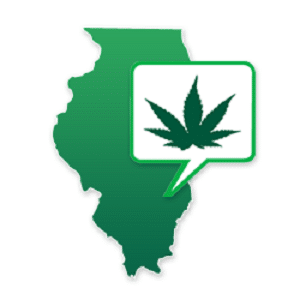
Right now Illinois has a flawed medical marijuana program. Patients aren’t allowed to grow their own medicine, and there is a limited number of conditions that qualify a patient for the program. That’s just two examples out of many of the deficiencies of Illinois’ medical marijuana program. Attempts to expand the program have been thwarted by the Governor, and since the program is a pilot program, there’s not even any guarantee that it will continue after the pilot program period ends.
The results of a poll were released today by by the Paul Simon Public Policy Institute which found that 82 percent of Illinois voters that were surveyed support medical marijuana. So why is the program so limited? Unfortunately the support for recreational cannabis wasn’t as high, although 45% is still within striking distance of a majority. It will just take some educating and spreading awareness. Below are the results of the poll, which can also be found at this link here:
Voters in Illinois show overwhelming support for medicinal marijuana use, but less than half of them support legalization for recreational use, according to a new poll conducted by the Paul Simon Public Policy Institute at Southern Illinois University Carbondale.
The sample of 1,000 registered voters was taken Feb. 15 – 20 and has a margin of error of 3.1 percentage points.
When asked whether they favor or oppose legalized medicinal marijuana in Illinois, 82 percent express support for the policy. Only 16 percent oppose and 3 percent did not know or answered otherwise.
Currently there is a four-year pilot program in Illinois for the use of medical marijuana. That program is due to expire in 2018.
Overall support for medical marijuana has increased dramatically – by 19 percentage points – and opposition has been cut in half since a 2013 Institute poll asked a similar question. The 2013 poll showed 63 percent support and 32 percent opposition. The 2013 poll was taken before the current medicinal marijuana pilot program was in effect.
Support is less strong on the question of recreational marijuana. There are 51 percent who oppose legalization of recreational marijuana while 45 percent said it should be legal. “We see clear support for medicinal marijuana, but recreational use is a mixed bag,” said David Yepsen, director of the Institute. “Medical use, recreational use, and decriminalization are all related but are still distinct public policy issues in the minds of many voters. They are likely to be issues in the debate over criminal justice reform, new revenues and public health,” he said.
Support for medicinal marijuana is strongest with younger voters. Among voters younger than 35, 90 percent favor medical use. Only 8 percent of those under 35 oppose medicinal use and 2 percent answered otherwise. On average, older voters were also supportive but not as strongly. Younger voters are also much more supportive of legal recreational use than older voters. Among those younger than age 35, 72 percent support and 24 percent oppose. Support significantly decreases among people over 65 years old – with only 29 percent in support.
“These data show that substantial support for medical cannabis can be found in every demographic, and that support has substantially increased in the last few years. Another result to pay attention to is the heavily skewed support for recreational marijuana among millennials,” said Delio Calzolari, associate director of the Institute and one of the designers of the poll. The poll also gauged attitudes toward gay marriage and abortion.








